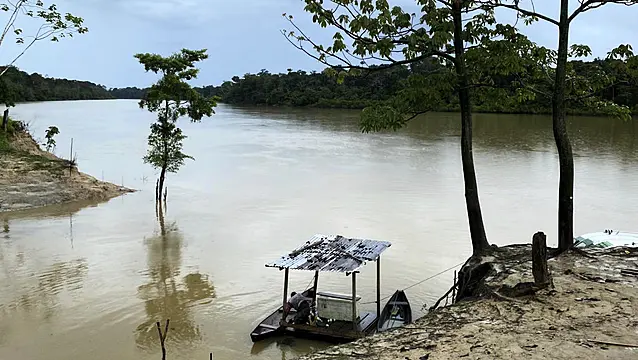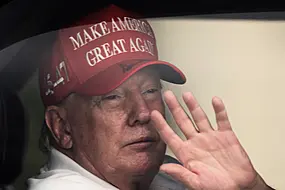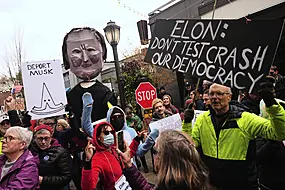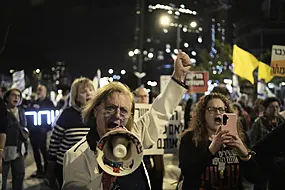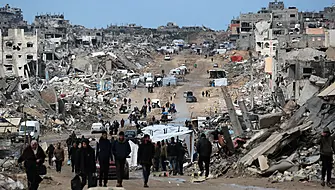Brazilian authorities began using helicopters on Wednesday to search a remote area of the Amazon rainforest for a British journalist and an indigenous official missing more than three days.
Civil police in the Amazonas state also said they had identified a suspect, who was arrested for allegedly carrying a firearm without a permit, which is common practice in the region.
But general Carlos Alberto Mansur, the state’s public security secretary, said later that officials did not have any concrete evidence to tie the man to the disappearances.
“We’re looking for a possible link, but for now, we have nothing,” Mr Mansur said at a news conference.
The suspect, Amarildo da Costa de Oliveira, also known as “Pelado”, remained in custody, he said.

Police have questioned five others since the investigation started, but no arrest related to the disappearances has been made, authorities said in their first joint public address.
Dom Phillips, who has been a regular contributor to The Guardian newspaper, and Bruno Araujo Pereira, an employee of the Brazilian indigenous affairs agency with extensive experience in the region, were last seen early on Sunday in the Sao Rafael community, according to the Univaja association of people in the Vale do Javari indigenous territory.
The two had been threatened on Saturday when a small group of men travelled by river to the indigenous territory’s boundary and brandished firearms at a Univaja patrol, the association’s president, Paulo Marubo, previously told The Associated Press.
Mr Phillips photographed the men at the time and the man known as Pelado was one of them, Mr Marubo said.
The two men were returning by boat to the nearby city of Atalaia do Norte on Sunday morning, but never arrived.
Indigenous leaders on the ground, family members and peers of Mr Pereira and Mr Phillips have expressed concern that authorities’ search efforts were slow to start, and remain insufficient.
“The Brazilian state says it has deployed a great task force in the region. This is not true,” Eliesio Marubo, Univaja’s legal advisor, said on Tuesday.
“They promised that, today, they would send a helicopter to fly over the area and it also didn’t happen. Now it is 4pm, it was supposed to arrive at 2pm, and until now nothing. The fact is that we continue the search alone.”
A federal court on Wednesday ordered that authorities provide helicopters and more boats, after Univaja and the federal public defender’s office filed a request.
The army’s Amazon division said in a statement on Tuesday evening that it had launched its first search and rescue operations on Monday afternoon — a day-and-a-half after the pair went missing — and that 150 members of the military had since joined the operations. A helicopter was also on its way, but had not yet reached the area.
Mr Phillips, 57, has reported from Brazil for more than a decade and has been working on a book about preservation of the Amazon with support from the Alicia Patterson Foundation.

His wife, Alessandra Sampaio, recorded a video pleading with the government and authorities to intensify search efforts.
“We still have some hope of finding them. Even if I don’t find the love of my life alive, they must be found,” she said in the video posted on Twitter.
Mr Pereira has long operated in Javari Valley for the Brazilian indigenous affairs agency. He oversaw their regional office and the co-ordination of isolated indigenous groups before going on leave. For years, he received threats from illegal fishermen and poachers.
The Javari Valley region has experienced repeated shootouts between hunters, fishermen and official security agents in the area, which has the world’s largest concentration of uncontacted indigenous people. It is also a major route for cocaine produced on the Peruvian side of the border, then smuggled into Brazil to supply local cities or to be shipped to Europe.
In September 2019, an employee of the indigenous affairs agency was shot dead in Tabatinga, the largest city in the region. The crime was never solved.
On Tuesday, President Jair Bolsonaro drew criticism when describing the two men’s work as an “adventure”.
“Really, just two people in a boat in a completely wild region like that is not a recommended adventure. Anything could happen. It could be an accident, it could be that they have been killed,” he said in an interview with television network SBT.
“We hope and ask God that they’re found soon. The armed forces are working hard.”
